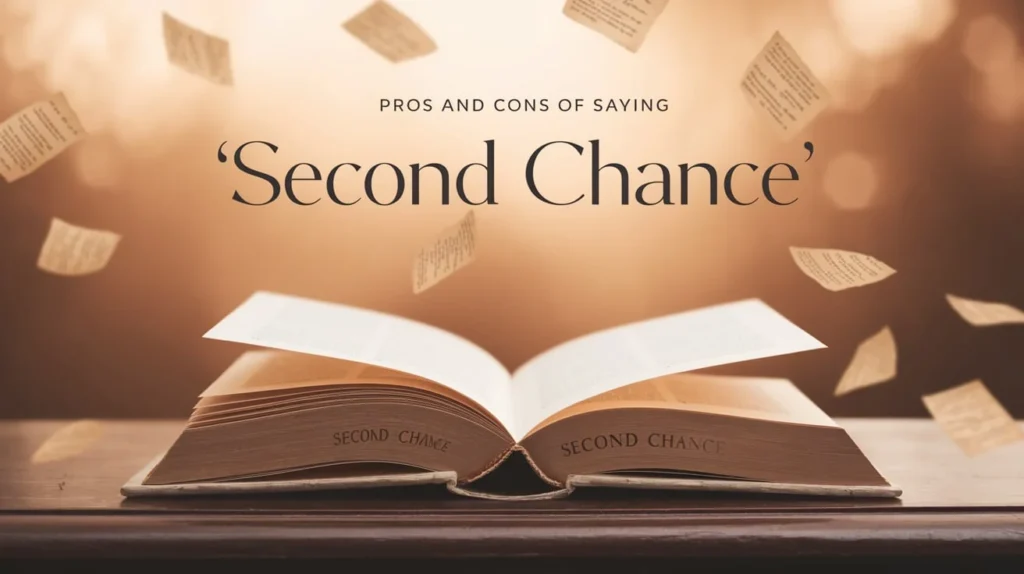Sometimes, finding the right words to say “second chance” can make all the difference. Maybe you’re trying to make things right, forgive someone, or give hope. Using thoughtful and kind words helps the other person feel seen and cared for. That’s why this list is here—to help you express second chances in ways that feel genuine, warm, and human.
What Does “Second Chance” Mean?
When we talk about a “second chance,” we’re talking about giving someone (or something) another opportunity to do better—to try again. It often means forgiving a mistake or starting fresh after something didn’t work out.
It could be about love, friendship, work, or even life itself. And saying it kindly can really touch someone’s heart.
Is It Professional/Polite to Say “Second Chance”?
Yes, it usually is. “Second chance” is polite and clear, especially when you’re being honest and sincere. But depending on the situation—like a formal email or a sensitive talk—sometimes softer or more gentle phrases can help you express it even better.
That’s where these alternatives come in handy.
Pros and Cons of Saying “Second Chance”

Pros:
- Easy to understand
- Feels hopeful and forgiving
- Works in casual and serious situations
Cons:
- Might feel a little overused
- Can sound a bit direct in delicate conversations
- Sometimes feels too final—what about third chances?
Synonyms For “Second Chance”
- Fresh Start
- New Beginning
- Another Try
- Clean Slate
- Do-Over
- Take Two
- Try Again
- Round Two
- Another Shot
- Redemption Moment
- Reboot
- Reset Button
- Forgiveness Opportunity
- New Chapter
- Grace Period
- Comeback Moment
- Mulligan
- Reopening the Door
- Turning the Page
- Giving Grace
1. Fresh Start
This phrase feels like wiping the slate clean. It’s about beginning again without holding on to the past.
Scenario Example:
Hi Lily,
I know things didn’t go the way we hoped last time, but I truly believe we deserve a fresh start. Let’s reconnect and see where this can go.
Warmly,
David
Best Use: When you want to move on together with no hard feelings.
Additional Note: It works beautifully in both friendships and romantic situations.
2. New Beginning
“New beginning” has a gentle, hopeful tone. It feels like turning the page in a story.
Scenario Example:
Dear Mark,
Let’s treat this project as a new beginning. We’ve learned a lot from the past, and I’m ready to do it right this time.
Thanks,
Sandra
Best Use: When starting a new phase in work or relationships.
Additional Note: Great for professional settings too!
3. Another Try
This one is super casual and easygoing. It feels real and down-to-earth.
Scenario Example:
Hey Mia,
Do you think we could give it another try? I’ve had time to reflect, and I think we can make it work.
Let me know,
Jake
Best Use: Perfect for friendly or romantic conversations.
Additional Note: Sounds humble and sincere.
4. Clean Slate
This is a classic one—it means totally letting go of what happened before.
Scenario Example:
Hi Clara,
I’m reaching out to see if we could start over with a clean slate. No pressure—just open hearts.
Take care,
Ben
Best Use: When you want to rebuild trust.
Additional Note: Especially helpful when there’s been conflict.
5. Do-Over
Sounds playful but powerful. It means, “Let’s try that again, but better.”
Scenario Example:
Hi Jordan,
We kind of fumbled that last meeting—how about a do-over next week, just the two of us?
Best,
Carla
Best Use: Light-hearted situations or casual work settings.
Additional Note: Keep it friendly to avoid sounding dismissive.
6. Take Two
Straight out of a movie scene, this one’s short, sweet, and optimistic.
Scenario Example:
Hey Ravi,
Let’s call that last call our rehearsal—how about a take two this Friday?
Cheers,
Anna
Best Use: Creative or team settings where humor fits.
Additional Note: It adds a bit of charm and lightness.
7. Try Again
Simple, kind, and straight from the heart. No fluff, just honesty.
Scenario Example:
Dear Jen,
I really messed up, and I’m sorry. I’d love the chance to try again—with everything I’ve learned.
Sincerely,
Leo
Best Use: When taking accountability is important.
Additional Note: Works in both personal and professional life.
8. Round Two
This one’s playful but full of hope. It means you’re not giving up just yet.
Scenario Example:
Hey Marcus,
Not sure if you’re open to it, but how about round two on that idea we had? I’ve got some new thoughts.
Best,
Tom
Best Use: When you’re revisiting a past attempt.
Additional Note: Good when you want to keep it light but meaningful.
9. Another Shot
A phrase full of humble energy—it shows you’re ready to make it right.
Scenario Example:
Hi Elise,
I know I dropped the ball last time. I’m just hoping you’ll give me another shot.
Thanks,
Greg
Best Use: Honest moments where you’re asking for grace.
Additional Note: Make sure your tone is genuine.
10. Redemption Moment
This one sounds deep—it’s about making up for something that went wrong.
Scenario Example:
Dear Carla,
This next phase is my redemption moment. I’m ready to show what I’ve learned.
Warm regards,
Ethan
Best Use: When you’ve grown and want to prove it.
Additional Note: Adds emotional depth to your message.
11. Reboot
Techy but catchy—it’s like restarting your system and clearing the bugs.
Scenario Example:
Hi Rachel,
Our last talk got messy. Let’s hit the reboot button and try this again with open minds.
Cheers,
Aaron
Best Use: For miscommunications or team conflicts.
Additional Note: Adds a modern vibe to your message.
12. Reset Button
Like reboot, but with a softer, more emotional twist.
Scenario Example:
Hey Tim,
We’ve both made mistakes. Can we hit the reset button and try again from a better place?
Best,
Nina
Best Use: When emotions are involved, and kindness matters.
Additional Note: Great for romantic or family situations.
13. Forgiveness Opportunity
This phrase shows vulnerability and courage. You’re not just asking—they’re offering grace.
Scenario Example:
Dear Alex,
I’m writing to ask for a forgiveness opportunity. I know I hurt you, and I’m sorry.
With care,
Marie
Best Use: When you need to take deep responsibility.
Additional Note: Use it when you’re ready for a heartfelt talk.
14. New Chapter
This one’s for people who love stories—it’s about writing the next page.
Scenario Example:
Hi Owen,
We’ve had our ups and downs. But maybe this is the start of a new chapter for us.
Take care,
Jess
Best Use: When moving forward feels like a shared journey.
Additional Note: Soft and poetic, perfect for close relationships.
15. Grace Period
This is more about time—it gives someone room to grow without pressure.
Scenario Example:
Hi Mia,
I know deadlines are tight. If you need a grace period, just say the word. We’ve got your back.
Thanks,
Ryan
Best Use: In work or support situations.
Additional Note: Shows trust and understanding.
16. Comeback Moment
This one’s bold—it’s about bouncing back after a setback.
Scenario Example:
Hey Sam,
Let’s make this pitch our comeback moment. We’ve got this.
Cheers,
Lena
Best Use: When rallying a team or friend after failure.
Additional Note: Motivational and energetic.
17. Mulligan
Borrowed from golf—it means redoing something without penalty.
Scenario Example:
Hi Eric,
I know the meeting didn’t go well. Can I get a mulligan next week? I’ll come prepared.
Thanks,
Kim
Best Use: Friendly, light-hearted workplace talks.
Additional Note: Use it when both sides can laugh a little.
18. Reopening the Door
This phrase is soft and hopeful. It feels like you’re gently knocking, not forcing your way back in. It says, “I’m open if you are.” It’s especially helpful when emotions are still tender and you want to respect someone’s space while showing you care.
Scenario Example:
Hi Chloe,
I’ve been thinking about our last conversation. If you’re open to it, I’d love to talk. Just hoping we can reopen the door and take things one step at a time.
Warmly,
Tom
Best Use: When you’re hoping to reconnect after a misunderstanding or time apart.
Additional Note: Use this when you’re ready to listen and not rush. It’s gentle, respectful, and shows emotional maturity.
19. Turning the Page
This one paints a beautiful image—it’s like saying, “Let’s move on to a better part of the story.” It doesn’t erase the past, but it puts it behind you. If you want to say you’re ready to move forward without dragging old baggage, this is a perfect choice.
Scenario Example:
Hi Kate,
We’ve both grown from this, and I think it’s time to turn the page. No blame—just growth and forward motion. Let’s try again, with more understanding this time.
Take care,
Liam
Best Use: When both sides have healed a bit and are ready to move forward.
Additional Note: It’s peaceful and thoughtful, great when you want to encourage hope without pressure.
20. Giving Grace
“Giving grace” feels tender and deep. It means offering someone kindness, forgiveness, or understanding—even when they haven’t fully earned it. It’s not just a second chance—it’s love in action. This one shows compassion in its purest form.
Scenario Example:
Dear Amanda,
You showed me so much patience and kindness when I truly needed it. Thank you for giving me grace—I don’t take it for granted, and I’ll do everything I can to honor that.
With gratitude,
Mark
Best Use: When someone has already forgiven you or when you want to express deep thanks for their patience.
Additional Note: Best used in personal moments. It’s heartfelt, emotional, and reminds people that kindness changes everything.
Conclusion
Finding the right words for a second chance can make people feel seen, heard, and cared for. Whether it’s a “fresh start” or someone “giving grace,” each of these phrases offers a unique way to express hope, healing, and honesty. They’re not just words—they’re bridges to understanding and connection.
Next time you’re reaching out, remember: it’s not just what you say—it’s how you make the other person feel when you say it.















